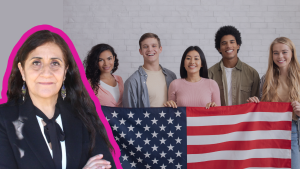
Listen to this note:
The vote of young immigrants is crucial in the upcoming presidential elections that will take place in the United States in November. The children of migrant communities have reached voting age, so the second and third generations are ready to make decisions for themselves, their families and their community.
"We believe that it is essential that our communities go out to vote and there are possibilities to make a change, to make a difference, we know that the white vote and the African-American vote are almost tied, but the vote of the Latino community can make a difference," said Adelina Nicholls, during the radio program Hecho en California with Marcos Gutierrez.
Adelina Nicholls is a sociologist from the Autonomous University of Mexico and has lived in Atlanta for many years. She is currently the executive director of the Georgia Alliance for Human Rights, and has worked with the most vulnerable immigrant communities for years.
For Adelina, people who can vote have a privilege that many would wish for; young people who are new voters come from Latin American families, mostly undocumented, however, they do not feel enthusiastic about voting because they do not sympathize with the candidates and their proposals.
According to migration statistics from the International Organization for Migration (IOM) 2023 annual bulletin, the majority of migrants entering Mexico do so with the intention of reaching the southwestern border of the United States. In 2023, a total of 2,542,074 migrant encounters were recorded on the southwestern border of the United States.
In 2018, a large number of young children of immigrants were voting for the first time, which is why one of the most important civic outreach programs was started. This program is focused on voting issues to raise awareness of the importance of citizen participation, said Nicholls.
Election issues, Nicholls said, should be of interest to young people because they directly impact the opportunities that may come to them, their friends and family. For example, in Georgia, citizens have not had access to a driver's license for about 25 years and face constant traffic tickets.
"What we are asking for is that the vote be used to protect communities, that this privilege be used to help and not to divide, because the vote is about us, not about them, the candidates," he stressed.
Nicholls is currently working on issues related to voting, especially the impact of participation by Latin American communities, who face the greatest misinformation and rejection due to not feeling like an important sector.
The work that has been carried out in the state of Georgia has been organizing grassroots communities, mainly immigrants, where they have been working for 25 years with low-income communities, giving priority to rural areas.
“We believe that this work is essential to create a network that is aware of the needs of these migrant communities, whether they have documents or not,” Nicholls said.
He concluded by saying that although demographic change is coming, a change of mentality is needed to truly take into account the young people who represent the future of the country.
You may be interested in: Trump's immigration plan: system that puts residents and migrants at risk

